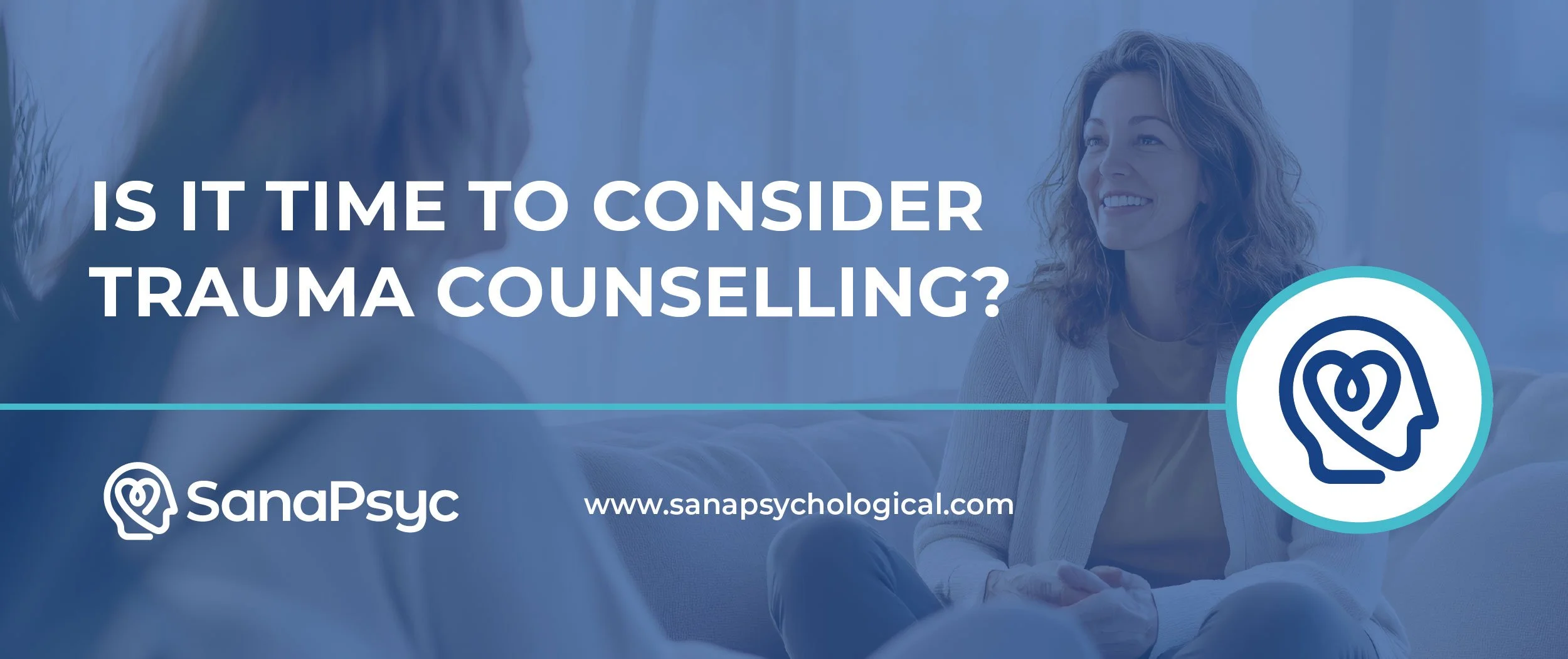7 Signs That It’s Time to Consider Trauma Counselling Calgary
Most of us will experience stressful or painful events in our lives but, sometimes, those events overwhelm our ability to cope, leaving lasting effects on our mind, body, and emotions. This is trauma. Trauma isn’t just what happened to you—it’s also how your body and nervous system responded in order to survive.
While many people are able to heal with time, support, and self-care, others may notice ongoing symptoms that interfere with daily life. If that’s the case, professional counselling can make a world of difference. In this blog, our trauma counselling Calgary therapists explore symptoms of trauma, when to seek out counselling, and what trauma counselling is like, among other things.
Common Trauma Symptoms From Our Trauma Counselling Calgary Therapists
Trauma affects everyone differently, but there are some common patterns you may notice that our trauma counselling Calgary therapists share with you:
Intrusive memories or flashbacks — reliving the event or feeling “stuck” in it.
Nightmares or disturbed sleep — frequent bad dreams, difficulty falling asleep, or waking up in panic.
Avoidance — steering clear of people, places, or conversations that remind you of what happened.
Hyperarousal — feeling constantly on edge, jumpy, or easily startled. Learn more about these symptoms in the context of trauma and Post-Traumatic Stress Disorder (PTSD) here.
Numbing or disconnection — difficulty feeling emotions, feeling detached from others, or shutting down.
Changes in mood or thoughts — shame, guilt, negative self-beliefs, or a persistent sense of danger.
Physical symptoms — headaches, stomach issues, chronic pain, or fatigue with no clear medical cause.
It’s normal to experience some of these reactions right after a traumatic event. But if they last for weeks or months—or begin disrupting your daily life—it may be time to reach out for trauma counselling Calgary.
7 Signs It’s Time to Seek Out Trauma Counselling Calgary
Here are seven key indicators that talking to a trauma counselling Calgary therapist could help:
1. You feel “stuck” in the past
If you find yourself reliving the trauma, unable to move forward, or feeling like the event just happened yesterday, trauma counselling Calgary can help you process and integrate the memory/ies in a different way that feels less impactful.
2. Daily life feels overwhelming
Struggles with concentration, work, relationships, and/or daily responsibilities may mean your nervous system is overtaxed by unresolved trauma. Trauma counselling Calgary can help reduce symptoms so that your mind is free to focus on what is right in front of you, not what happened to you before.
3. You avoid important parts of your life
Avoidance—whether it’s skipping social events, dodging reminders of the trauma, or numbing with substances—can shrink your world. Therapy can help gently reopen it.
4. You’re experiencing intense emotional reactions
Anger, fear, sadness, or shame that feels “out of proportion” to present situations is often a trauma response. A therapist can help you regulate emotions safely.
5. Your body feels constantly on high alert
If you’re always tense, easily startled, or struggling with chronic pain, trauma may be showing up physically. Counselling often includes body-based techniques to calm the nervous system. We invite you to try some of these nervous system regulation strategies to see if that supports your wellness. These can be used in conjunction with trauma counselling Calgary.
6. Your relationships are suffering
Trust issues, conflict, withdrawal, or feeling disconnected from loved ones may signal that unresolved trauma is interfering with how you connect.
7. You feel hopeless or unsafe
If life feels meaningless, unsafe, or if you’re having thoughts of hurting yourself, it’s important to seek professional support immediately.
Do You Need Trauma Counselling? Self-Check Quiz Designed by Trauma Counselling Calgary Therapists
Still wondering if trauma counselling would be an appropriate fit for you? Try taking our self-check quiz “Do I Need Trauma Counselling?” to help provide you more understanding and information. This quiz has been thoughtfully designed by trauma counselling Calgary therapists who have worked in this area for years.
While this quiz cannot provide diagnostic information, nor is it a replacement for professional input and expertise, it is a good starting point to help get you reflecting on the areas in your life that untreated trauma can impact. If you notice that you are answering ‘yes’ to a lot of the questions, this indicates that you are likely being impacted by untreated trauma. The results will give you some gentle information and support around possible next steps.
Seeking out trauma counselling can feel overwhelming and scary, but it can also put people onto a road of recovery they never thought possible.
The Good News From Trauma Counselling Calgary Therapists: Recovery Is Possible
Trauma counselling doesn’t erase the past (nor is it meant to)—but it helps you reclaim your present and future. With the right therapist, you can:
Learn grounding and regulation skills.
Safely process traumatic memories.
Rebuild trust and connection.
Restore your sense of safety and control.
If you recognize yourself in these signs, reaching out isn’t weakness—it’s strength. Healing is not only possible, it’s your birthright.
Taking the Next Step
If you see yourself in these signs, reaching out for help is an act of courage—not weakness. To begin:
Search for a trauma counselling specialist in your area. Psychology Today can be a good resource tool to help you search, narrow and filter by your preferences. You are welcome to use our Sana Psychological Therapist Filter Tool to help you if you are interested in support from our trauma counselling Calgary specialists.
If cost is a concern, look into community mental health centers or sliding-scale therapy.
If you’re in crisis or struggling with thoughts of self-harm, call your local emergency number or a crisis hotline right away
Learn about the different types of trauma treatment to see which method(s) appeal to you
What to Expect in Trauma Counselling Calgary
Whether you’re seeking support after a single traumatic event or years of complex trauma, counselling can be a powerful step toward healing. Here’s what you can expect during the process from our trauma counselling Calgary therapists:
1. A Safe, Supportive Environment
The first priority in trauma counselling is creating a safe and non-judgmental space. Your therapist will help you feel emotionally secure and at ease so that you can begin to explore difficult experiences at your own pace.
You don’t have to share everything right away—or even talk about the trauma at all in the beginning. Your comfort and readiness are always respected.
2. Getting to Know You
Early sessions will focus on building rapport (which is the therapeutic relationship) and understanding your story—including your history, coping mechanisms, and current struggles. This may include:
Your reasons for seeking counselling
Any past experiences with therapy
Your goals and hopes for healing
Your trauma counselling Calgary therapist may also gently assess symptoms of trauma, such as anxiety, flashbacks, dissociation, or avoidance as you are ready.
3. Understanding the Effects of Trauma
You’ll likely explore how trauma affects the brain, body, emotions, and relationships. Understanding why you feel or react a certain way can be deeply validating and empowering.
Common topics during these conversations with a trauma counselling Calgary therapist may include:
Fight/flight/freeze responses (which can include polyvagal theory)
Hypervigilance or emotional numbing
Trust and attachment issues
Shame and self-criticism
This part of therapy helps normalize your responses and reduce self-blame.
4. Developing Coping Tools and Grounding Techniques
Before diving into trauma memories, trauma counselling Calgary therapists will help you build emotional regulation skills, which may include:
Deep breathing or grounding exercises
Self-soothing practices
Mindfulness and body awareness
Managing panic or dissociation
These tools help you feel more in control during and between sessions and helps create internal safety which is an important aspect of the trauma counselling and recovery process.
5. Processing the Trauma (When You're Ready)
At the right time—and only when you feel safe—your trauma counselling Calgary therapist may guide you in processing traumatic memories using different approaches that they are trained in, such as:
Talk therapy (narrative or psychodynamic work)
EMDR (Eye Movement Desensitization and Reprocessing)
Somatic therapy (body-based techniques)
Cognitive Behavioral Therapy (CBT)
Internal Family Systems (IFS)
Processing doesn’t mean reliving the trauma. It means working through the emotional impact so it no longer dominates your life. These methods are meant to help you shift your experience of the memories so that they feel different when they come up and have less impact.
6. Reclaiming Your Power
Trauma counselling Calgary isn't just about reducing symptoms—it’s about rebuilding trust in yourself, your body, and your relationships. Over time, many people experience:
Increased self-awareness and self-compassion
Healthier boundaries and relationships
Relief from anxiety, guilt, or shame
A stronger sense of self and purpose
With trauma counselling Calgary, it is important to remember:
You’re in control: You decide what to share and when.
Healing takes time: Be patient with yourself. Progress may be slow and non-linear.
It’s okay to feel overwhelmed: Your therapist is trained to support you through tough emotions.
Starting trauma counselling is a brave and meaningful step. It’s not about "fixing" you—because you're not broken. It’s about making sense of your experiences, reconnecting with yourself, and finding ways to move forward.
If you’re considering trauma counselling Calgary, it is important to connect with a therapist that you feel open to even from the time that you see their picture and read their bio. Trust and safety are the foundation of good therapy. It is okay to have multiple consultations in order to find the right fit for you. A good therapeutic relationship is the basis of good therapy.
Sana Psychological offers trauma counselling in Calgary, AB and virtually as well as mental health and addiction support for other aspects of health too. In addition to therapy, we also have free online resources in addition to our regular blog.



